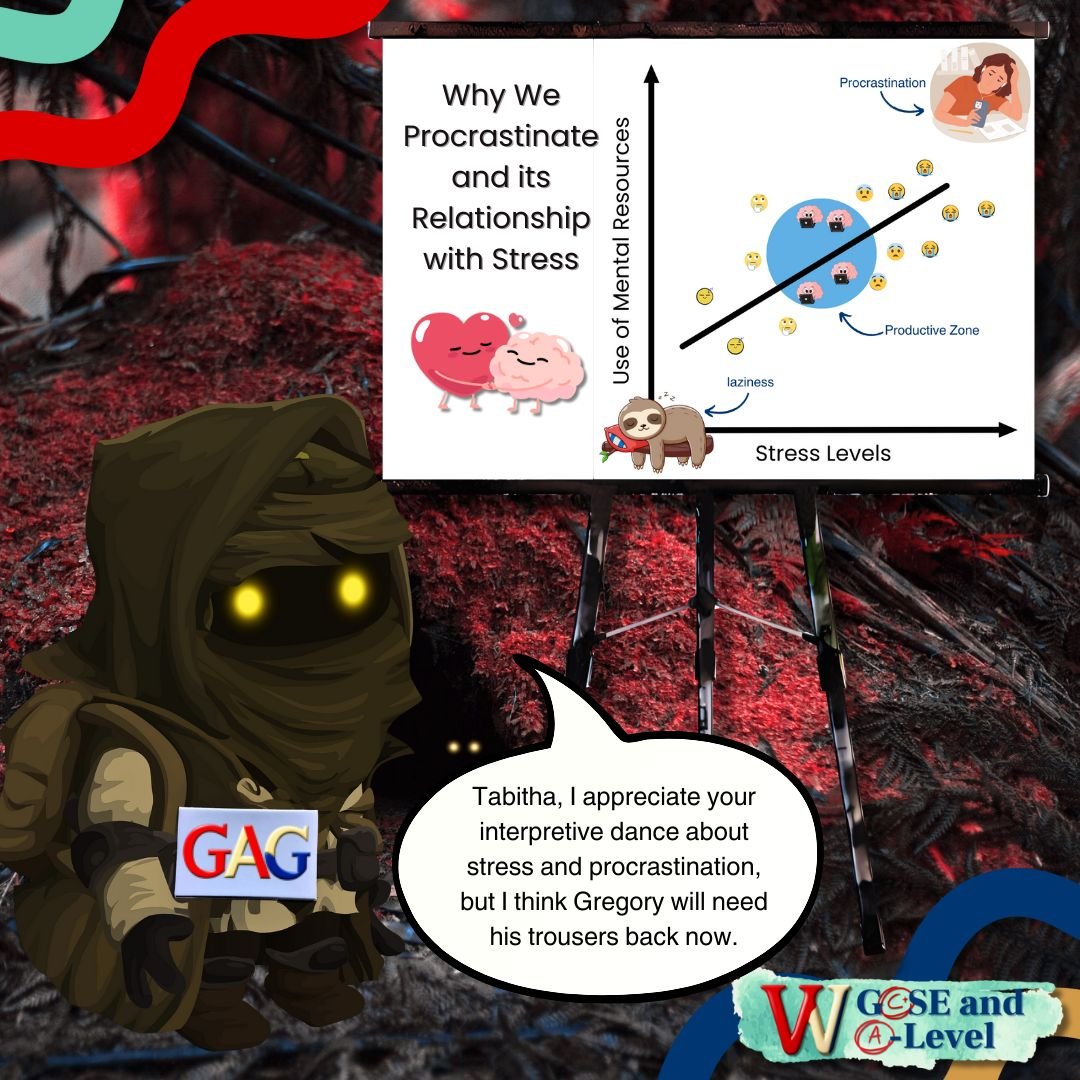The GCSE and A-Level Goblin: Why We Procrastinate and its Relationship with Stress
“Tabitha! Nobody wants to see Gregory give his presentation on the themes in ‘An Inspector Calls’ in his boxer shorts.
If you are studying for your GCSEs or A-Levels this year, you are no stranger to stress. If you aren’t stressed, you are superhuman and I want to know your secret… so I can bottle it… and sell it… But, the point is that it’s really common to get very stressed out and it’s extremely common to procrastinate because of it. So, let’s explore the relationship between stress and procrastination, so you can see how important it is to look after yourself like you are an extremely valuable china vase.
What Is Procrastination?
It’s a word that parents and teachers like to use a lot, but essentially procrastination is when you are either doing nothing, or lots of unrelated things, when you know you should be working on something important. So, for example, you might have a GCSE exam coming up, but you decide to make pictures out of letters and numbers instead of revising for physics (this is purely an example and absolutely NOT what I did when I was taking my GCSE exams forever ago).
Why Do We Procrastinate?
This is where things get interesting, and where things might be a bit different from what you have been told. We don’t procrastinate because we are lazy. Or to be more accurate, we don’t always procrastinate because we are lazy, most of the time we procrastinate because we are too stressed. To explain why properly I need to wow you with this amazing graph I made and explain how stress uses up our thinking power / cognitive resources / study goo, or whatever you want to call it.
Stress Levels and Mental Resources
Laziness: When our stress levels are low, we don’t use much, or any, of our mental resources. That means we have a lot of resources available to do what we want with. But, at the same time, having very low stress levels means there isn’t much motivating us to get started on our work. We feel like we have plenty of time and can start later.
Productive Zone: The hot spot for getting things done is when we are just stressed enough that we are motivated to get our work done, because we want to avoid bad consequences, but we aren’t using all of our mental resources. Higher stress uses more of our brain power, but there is still enough available to get our task done.
Procrastination: This is worse than Laziness because you still get nothing done, but you are also extremely unhappy. We procrastinate when we are at, or close to, maximum stress. This crazy-high stress level uses almost all of our mental resources, and there is nothing left to complete work with. At this point, all we have the mental resources to do is think of ways to avoid stress.
The takeaway here is that procrastination happens when we are already too stressed to work, and it happens because that’s the only option we have left with the extremely low mental resources available. If you aren’t stressed and you still aren’t getting things done, you have my permission to call it laziness.
How Can We Avoid Procrastinating?
Now we know that procrastination is the baby of stress and low mental resources we can think up helpful ways of getting work done and not procrastinating.
Try to keep stress low - this includes friends and family trying to “motivate” you! Politely explain that increasing your stress makes it harder to work.
Get support for your mental health if it could help you.
Make your study plan or schedule long before you need it - this way you can’t use it as a way to avoid actual studying!
Look at the next step, not the big picture - starting is the hardest part so at the beginning just focus on making a start. It’s like building a house - that’s extremely complicated, but making a start might just be writing a list of the things you want your house to have. Now you have started, you’ll find it easier to move on to the next step.
Combat laziness by doing it for future you - it’s not easy because we are designed to be lazy - it’s a good survival strategy in the wild but it’s not very helpful in school. While you have all those juicy mental resources, push yourself to use them. Future you will thank you for it.
Try working with others - for some people, this is both a great way to motivate yourself out of the laziness zone and a good way of helping us calm back down from the procrastination zone.
Summing Up
If you are in the laziness or the procrastination zone it’s important to remember there is nothing “wrong” with you. You are just being a human doing human things. Procrastination is a natural result of high stress, and if I know anything it’s that schools love to stress us out about big exams. The solution to your procrastination might be as simple as getting in touch with a friend, making plans to work together in 2 hours, having a bubble bath, getting some tasty but healthy food, and wearing some comfy clothes. Reduce that stress, be kind to yourself, and focus on making a start. You’ll be surprised how easy it is to carry on once you have a start.
…thank you, Tabitha. It might have taken you half an hour but I’m sure Gregory is grateful to be back among the fully clothed again.”


